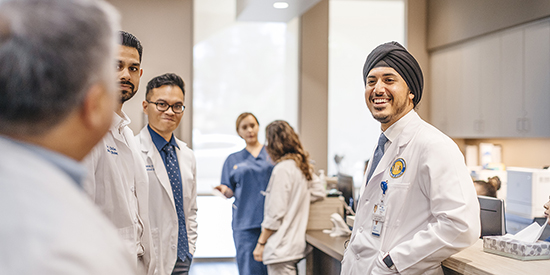Joining forces to fight pancreatic cancer
Share This Article

Although it doesn’t tend to get as much media attention as other diseases, pancreatic cancer is the third-leading cause of cancer-related deaths and is on track to become the second most fatal cancer by 2030. It is one of the few cancers that’s becoming more common, and those who are affected have a five-year survival rate of only 10%.
UC researchers and clinicians across the five UC Comprehensive Cancer Centers are working to address these bleak statistics through the UC Pancreatic Cancer Consortium (UCPCC), a partnership that launched in September 2017. By working together, they are able to share research advancements, produce collaborative grant applications, create centralized resources and optimize patient care — ultimately accelerating the progress and impact of their work.
In addition to conducting research, UCPCC members conduct a monthly seminar series with guest researchers from leading cancer institutes throughout the U.S. And this year, they’ve coordinated teams from all five cancer centers to participate in PurpleStride, a pancreatic cancer fundraising event organized by the Pancreatic Cancer Action Network (PanCAN) that’s held in communities nationwide on April 30. PanCAN uses the funds raised through PurpleStride and other events to fund scientific research, provide free case-management services to pancreatic cancer patients and their families, advocate for federal funding and promote community engagement.
“More than just an opportunity to fundraise, I see this as a great example of multiple UC campuses working together for a common cause,” says Kurt Giles, D.Phil., associate director, UCSF Pancreas Center and director of scientific affairs, UC Pancreatic Cancer Consortium.
Dr. Giles explains that participating in PurpleStride events gives researchers a unique opportunity to engage with more colleagues and the people whose lives they are working to improve every day. “A central focus of the UCPCC is to encourage collaboration between basic and clinical scientists across the five UC cancer centers, but that means mainly dealing with faculty. This event has brought me into contact with a much broader range of students, post-docs and clinical staff,” he says. And, “for those of us not involved in direct patient care, there’s a distance from the personal experience. PanCAN’s PurpleStride is an opportunity to more directly interact with patients, caregivers and families impacted by pancreatic cancer.”
There’s also a deep connection between PanCAN’s work and the strides taking place at UC. “PanCAN provides a range of services for patients and also support grants which have helped a number of UC faculty,” Dr. Giles says. “‘Giving back’ to help them raise awareness and funds is a virtuous cycle that advances research and improves patient care.”
It’s also been fun for researchers to come together in person — some for the first time since the COVID-19 pandemic began — and to show off their fundraising chops. “Having teams from five UC campuses provides a little friendly competition as we try to outraise one another!” Dr. Giles says.
Show your support
If you’d like to make a personal donation to support the UC teams participating in PanCAN’s PurpleStride, please use the links below.
Learn more about the UC Comprehensive Cancer Centers and UC Pancreatic Cancer Consortium.
